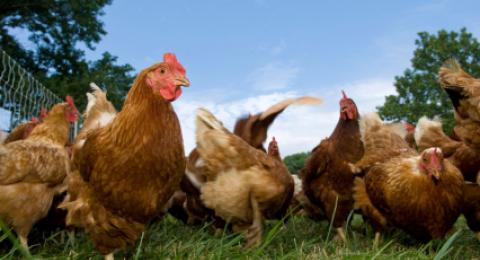Helpful Information for Granite Staters Considering Buying Eggs from Local Farmers
Whether fried, poached, scrambled or mixed into delicious baked goods for rise and richness, the humble egg has long been prized for its taste and nutritional value. There’s much to love about these daily treats; besides a rainbow of color and variety of use, they do not disappoint in satiety. In terms of nutritional value, eggs are one of the best sources of vitamins (A, B12, B2 and B5), minerals (iron, phosphorus, selenium) and protein.
Perhaps the most important aspect of an egg is accessibility; eggs are only beneficial if they are readily available for consumption. At any establishment that sells food, eggs are a staple, a must-have, a product that is assumed to be available when shopping for sustenance.
According to the USDA, New Hampshire citizens consumed just over 400 million eggs (33.3 million dozen) in 2022. Nationwide production of eggs in 2022 totaled 110.4 billion (9.3 billion dozen), meaning New Hampshire represented 4.3% of demand for that supply.
Why Are Eggs Sometimes Missing from Grocery Store Shelves?
There are a few factors that contribute to the decline in grocery store supply and the sharp increase in the price. Commercial retailers point to loss of birds due to Avian Flu and rising feed costs as contributing factors.
New Hampshire grocery stores stock out-of-state eggs because, simply put, there just aren’t enough birds in New Hampshire to lay the number of eggs needed to meet demand year-round. Chickens are seasonal layers. Chicken owners in New Hampshire can testify to the difficulty of maintaining egg production during seasons with limited light. While chickens are amazingly productive animals, they naturally slow or stop laying during late fall, winter and early spring. Some chicken owners opt to use artificial light to extend production, while others let their hens take the “au natural” approach.
During the time of limited local supply, customers in search of eggs can utilize the lower price options at grocery stores. Some consumers also might just prefer conventional, inexpensive eggs. Sometimes, a barrier to access might limit options for local eggs, such as residents who live in urban areas who are unable to travel.
New Hampshire is a Chicken-Friendly State
Overall, the volume of industrial and agricultural infrastructure in New Hampshire gives our state a strong base to support local egg production, consumption and sourcing. Many towns allow backyard chicken keeping for pets, food, 4-H and livestock project flocks or hobby farming. While the zoning and space requirements vary, it is easy for many New Hampshire citizens to purchase a coop and a few hens for fresh eggs and general enjoyment. Depending on the breed purchased, a flock of six to eight hens will produce enough eggs to feed a family of four for two to three years.
New Hampshire supports agricultural businesses on many levels. With a strong agrarian focus in many communities, eggs are sold by the roadside, at farmers markets, farm stands, grocery stores and in CSA boxes. They are also used in baked goods (commercial and small scale) and at restaurants. Educational resources are readily available covering topics such as food safety compliance, animal welfare and best business practices. Commercially, there are few barriers to entry for new agricultural businesses, and existing farms enjoy strong demand for locally grown, high-quality food.
Eggs Are Only as Good as Their Hens’ Feed
There are nine commercial feed mills between New Hampshire and Vermont that produce poultry feeds. Without an appropriate diet, hens are unable to produce nutritious eggs in volume. Keep in mind that eggs are only as “good” as what the chicken eats. Producers, hobby farmers and backyard flock owners alike can access fresh, high-quality feed at different volumes and prices that meet their business and nutritional needs. This includes three mills that have designated organic and non-GMO manufacturing lines for consumers or producers that align with those markets.
There’s a Correlation Between Price and Freshness
If grocery stores usually have a consistent supply of eggs at a lower price, consumers rightfully wonder why they would pay more at a local farm stand when they can purchase the same product at a grocery store for less. Jill Fudala, owner and farmer at The Little Red Hen Farm & Market, offers insight into why local and farm fresh eggs hold more value and command a higher price.
“Understanding how much money it costs to produce a dozen eggs – that’s the key,” she says. Transparency about egg pricing has been a critical aspect to conducting her business with integrity. “We have signage on our egg cooler that clearly states why we are selling them for market price. It is so important to us that we are paying farmers a fair price for their eggs since we know how much it costs to produce those dozens.”
Typically, the eggs that Fudala sells in her cooler are between two and ten days old. This freshness translates into a tastier benedict, fluffier pancakes and richer scrambles. Commercial grocery store eggs are often 4-8 weeks old at time of purchase because they are commonly shipped by trailer load from all over the United States. On a global scale, eggs laid and produced in New Hampshire are less taxing on the environment. Emissions are reduced when shipping commodities, raw ingredients and finished products within the state.
Even though Fudala has 120 hens as part of her diverse farm operation, she still needs local wholesale egg sources to keep up with farm stand sales. She emphasizes the importance of regular customers. “Small farms and farm stands feel every dollar of loss because our cost of production is higher, and our margins are smaller. We need those dollars to continue growing and offering high-quality and healthy products,” she says.
Wherever you purchase your dozen from, no matter the price, consider the impact of those eggs and savor each bite of your healthy meal!
Extension Services & Tools That Help NH Farmers Grow
Newsletters: Choose from our many newsletters for production agriculture
Receive Pest Text Alerts - Text UNHIPM to (866) 645-7010



